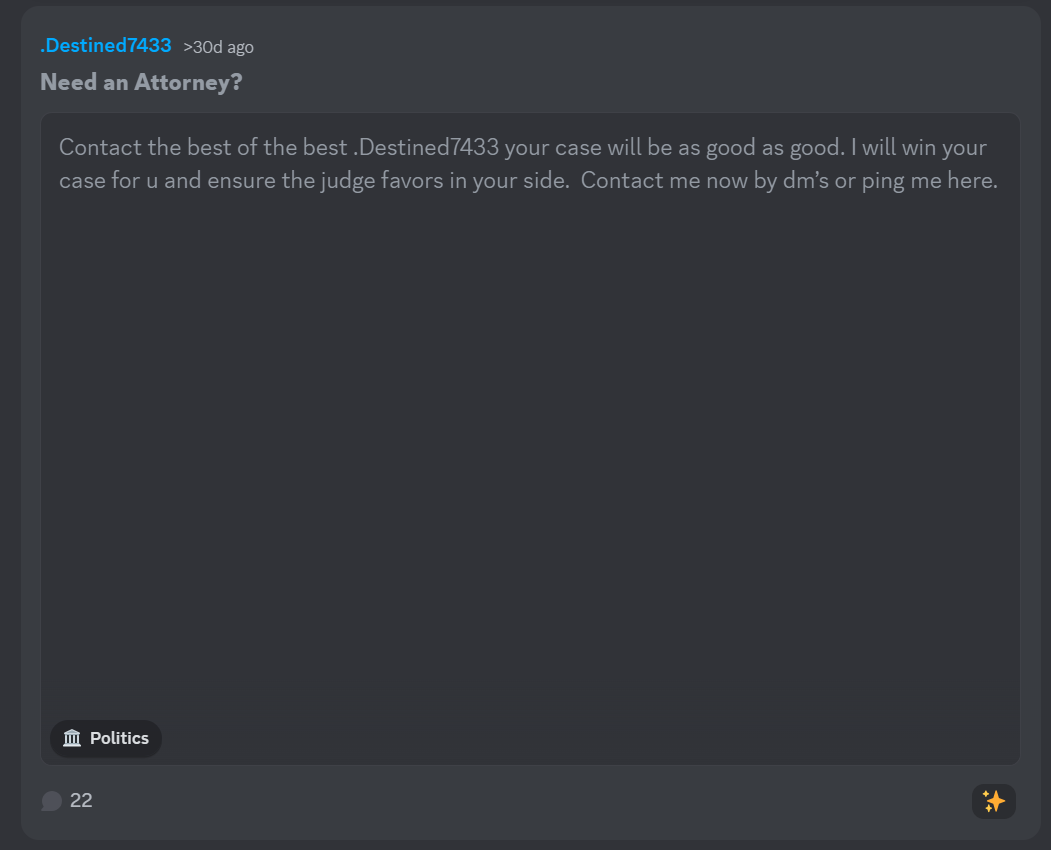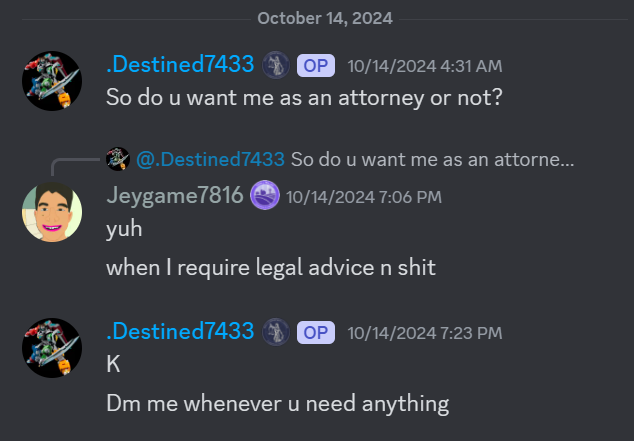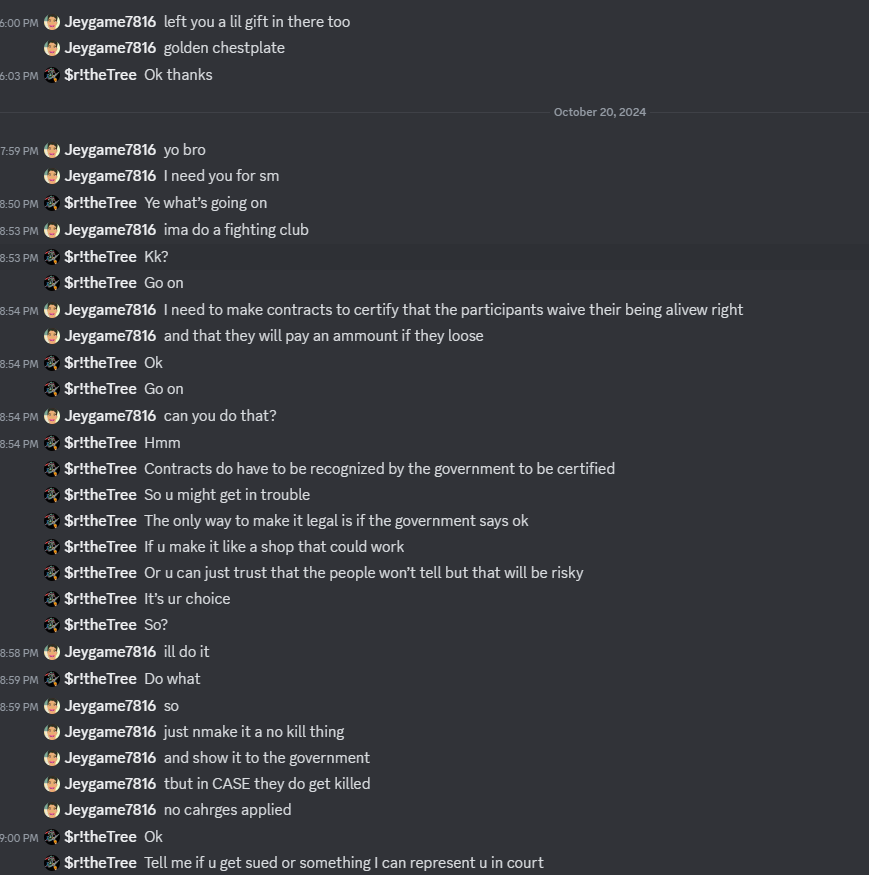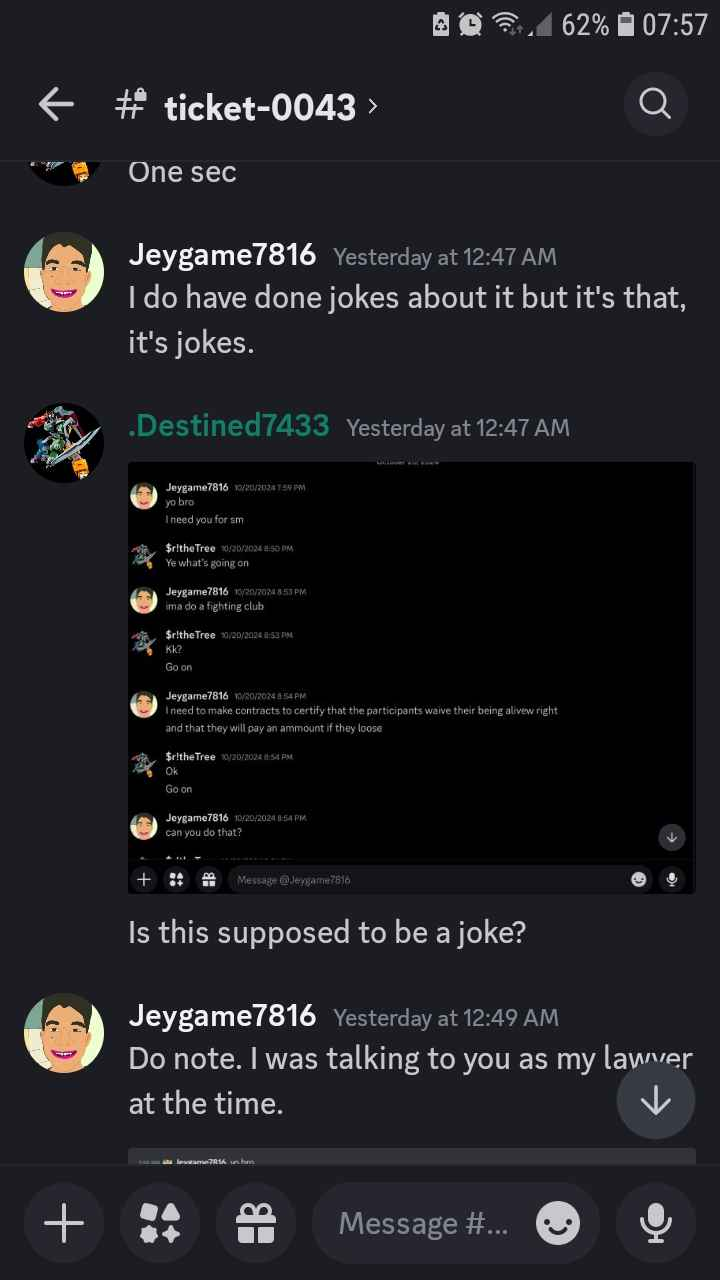dodrio3
Citizen
Supporter
Aventura Resident
Grave Digger
Change Maker
Popular in the Polls
Statesman
Dodrio3
Attorney
- Joined
- May 15, 2021
- Messages
- 415
- Thread Author
- #1
IN THE FEDERAL COURT OF THE COMMONWEALTH OF REDMONT
CIVIL ACTION
Joygame 7816 - represented by Titan Law
Plaintiff
v.
Destined7433,
Defendant
On October 1, 2024, the Defendant placed an advertisement in the DemocracyCraft Discord server seeking work as an attorney (P-001). On October 14, 2024, the Defendant told the Plaintiff, “k” and “Dm whenever u need anything” (P-002), thereby agreeing to be the Plaintiff's attorney and establishing attorney-client privilege as per the Legal Reform Act, which states: “Attorney-Client Privilege shall exist as soon as a client or potential client engages in a formal discussion with a lawyer or law firm regarding a case, potential case, or other legal matter.”
Between October 10 and October 30, the Plaintiff shared confidential information with the Defendant under the protection of attorney-client privilege (P-003, P-004, P-005, P-006). On October 30, 2024, the Defendant informed the Plaintiff that an investigation was underway and that he was working for the Department of Justice (DOJ) (P-006). The Defendant then disclosed portions of these confidential communications to the DOJ as part of its investigation (P-007), thereby breaching the Plaintiff’s attorney-client privilege in violation of the Legal Reform Act.
By making this submission, I affirm that I understand the penalties of perjury and acknowledge that I am subject to perjury charges should I knowingly make a false statement in court.
DATED: This 5 day of November, 2024.
P-001

P-002

P-003

P-004

P-005

P-006

P-007

CIVIL ACTION
Joygame 7816 - represented by Titan Law
Plaintiff
v.
Destined7433,
Defendant
COMPLAINT
The Plaintiff complains against the Defendant as follows:On October 1, 2024, the Defendant placed an advertisement in the DemocracyCraft Discord server seeking work as an attorney (P-001). On October 14, 2024, the Defendant told the Plaintiff, “k” and “Dm whenever u need anything” (P-002), thereby agreeing to be the Plaintiff's attorney and establishing attorney-client privilege as per the Legal Reform Act, which states: “Attorney-Client Privilege shall exist as soon as a client or potential client engages in a formal discussion with a lawyer or law firm regarding a case, potential case, or other legal matter.”
Between October 10 and October 30, the Plaintiff shared confidential information with the Defendant under the protection of attorney-client privilege (P-003, P-004, P-005, P-006). On October 30, 2024, the Defendant informed the Plaintiff that an investigation was underway and that he was working for the Department of Justice (DOJ) (P-006). The Defendant then disclosed portions of these confidential communications to the DOJ as part of its investigation (P-007), thereby breaching the Plaintiff’s attorney-client privilege in violation of the Legal Reform Act.
WRITTEN STATEMENT FROM THE PLAINTIFF
I. PARTIES
- Jeygame7816 - Plaintiff
- Destined7433 - Defendant
- Razorsharpbread - Lead Investigator and Witness
II. FACTS
- On October 1, 2024, the Defendant posted an advertisement in the DemocracyCraft Discord server seeking work as an attorney (P-001).
- On October 14, 2024, the Defendant agreed to represent the Plaintiff by stating, “k” and “Dm whenever u need anything” (P-002).
- Under the Legal Reform Act, attorney-client privilege applies as soon as a client or potential client engages in a formal discussion with a lawyer or law firm about a case or legal matter.
- Between October 10 and October 30, the Plaintiff shared confidential information with the Defendant, under attorney-client privilege (P-003, P-004, P-005, P-006).
- On October 30, 2024, the Defendant informed the Plaintiff of an investigation against them and revealed that he was working for the DOJ (P-006).
- The Defendant disclosed portions of their confidential communications to the DOJ as part of its investigation, breaching the Plaintiff’s attorney-client privilege (P-007).
III. CLAIMS FOR RELIEF
- The Defendant breached the Legal Reform Act by violating the Plaintiff's right to attorney-client privilege.
- The Plaintiff suffered emotional distress due to the unlawful use of confidential information in the DOJ investigation.
IV. PRAYER FOR RELIEF
The Plaintiff seeks the following relief from the Defendant:- $20,000 - For the breach of attorney-client privilege.
- $15,000 - In punitive damages for the Defendant’s conduct.
- $10,000 - In emotional damages due to the distress caused by the use of confidential information in a false investigation.
- $10,000 - For loss of enjoyment resulting from the stress caused by the Defendant’s actions.
- Temporary Disbarment - That the Defendant be disbarred for 2 months due to misconduct.
- $16,500 - In legal fees, representing 30% of the total case value.
By making this submission, I affirm that I understand the penalties of perjury and acknowledge that I am subject to perjury charges should I knowingly make a false statement in court.
DATED: This 5 day of November, 2024.
P-001
P-002
P-003
P-004
P-005
P-006
P-007
